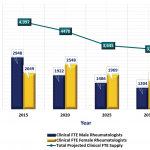Make a Difference in Rheumatology’s Future
The best way for you to positively affect the specialty’s future is one relationship at a time. According to an unpublished 2006 ACR survey of U.S. adult and pediatric fellows, early exposure to rheumatology can strengthen interest in the field.2 Nearly half of respondents stated that they first became interested in rheumatology in medical school. By far the most important factors that influenced fellows to choose rheumatology were a clinical mentor and a clinical rotation. Rheumatologists in academia have obvious opportunities to mentor trainees, but there are also opportunities for practitioners who are willing to mentor. The ACR organizes online mentoring networks and annual meeting informal mentoring sessions. Practitioners are always in high demand and short supply for these sessions. In addition, the REF offers preceptorships that require research and clinical mentors.
If we are worried about who will care for our patients when we retire, we should be equally concerned with the current challenges facing rheumatology training programs and those who run them. These programs will nurture the next generation of practitioners, researchers, and teachers who will support our patients at the bedside and develop new therapies that will improve patients’ quality of life.
If our patients are to benefit from future therapies and research advances, we must be concerned about the research funding available to develop those therapies. We must advocate for adequate research funding as well as access to care and new therapies that improve patient outcomes.
Academic rheumatology issues are not only the concern of the academic rheumatologists in our midst. It is every rheumatologist’s responsibility to ensure continued growth of the subspecialty and, as a result, the future care of their patients.
Dr. Birnbaum is president of ACR. Contact him via e-mail at [email protected].



